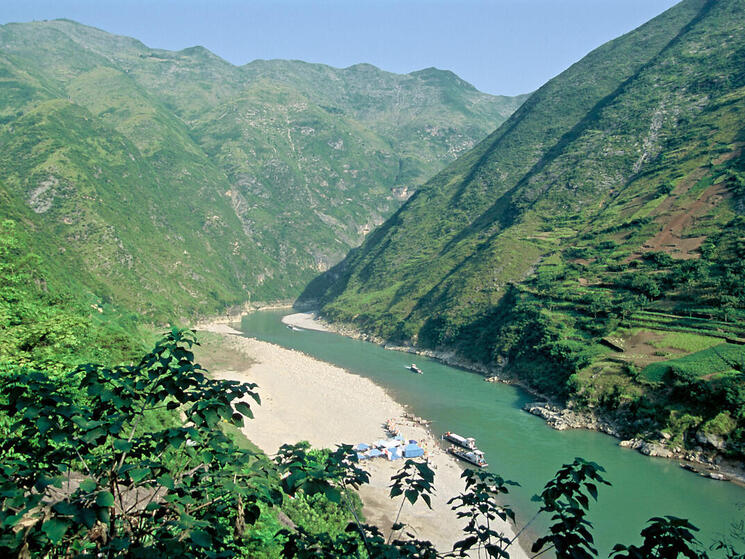
Building Freshwater Resilience in China and Beyond
- Date: 27 February 2023
Water is a vital element of life and one of the world’s most precious resources. However, with risks such as climate change, population growth, and changing consumption patterns, water is under threat. In fact, freshwater species are declining by 83%, faster than terrestrial or marine species. Humans are also at risk, with 1.1 billion people worldwide lacking access to water. By 2025, two-thirds of the world’s population may face water shortages.
Building resilient communities and ecosystems is a crucial step in the fight against the water crisis and climate change, something that the WWF and The Coca-Cola Company partnership is working toward. Across the world, the partnership has identified priority freshwater basins and collaborated with governments, local communities, and other businesses to ensure the long-term protection and sustainable management of freshwater resources. Coca-Cola’s charitable arm, The Coca-Cola Foundation, has also supported work in this area.
One example of this can be found in the partnership’s work along the Yangtze River in China.
The Yangtze River is the third longest river in the world. Running from the Tibetan Plateau in the west to the East Sea near Shanghai, its rich and complex terrains are important for their biodiversity, including the giant panda and finless porpoise. The river also contributes 40% of China’s gross domestic product and sustains local communities by providing drinking water, food, and transportation. Yet, due to challenges that include economic growth and rapid urbanization, the river has changed drastically, which impacts both biodiversity and ecosystems in the region.
WWF-China, The Coca-Cola Company and The Coca-Cola Foundation have a strong history along the Yangtze since 2007. Previously, the partnership created pilot projects along the river that were adopted and scaled up by the government, enabling the partnership to secure stronger environmental protection. The pilot projects included the construction of wetlands that cleanse household wastewater for rural communities, adaptation of sustainable agriculture practices near the river’s headwaters, and the creation of lake reserves for vulnerable species populations, including finless porpoises and migrating birds.

Pied Avocets in East Dongting Lake
Building off the success of these pilot projects, WWF-China and The Coca-Cola Company and The Coca-Cola Foundation scaled up their work and ambitions in the Yangtze River Basin, including deepening the collective efforts amongst Dongting sub-basin since 2013. The Dongting sub-basin covers a drainage area of 262,000 km2, equivalent to the size of Gabon, accounting for 14% of the entire Yangtze River Basin. The work in Da&Xiao-Xi lakes of East Dongting area, well illustrate evolving explorations of solutions for resilient lower wetland ecosystem in a changing environment.
Conservation of the Da&Xiao-Xi Lakes region started with early restoration efforts centered around co-management of the lake with the close local community that relied on it for fishing. It also included early restoration efforts with simple combinations of plant species to mimic complex native habitats. However, these methods brought lower biodiversity of fish and water birds than desired.
Recently, the partnership, along with the administration the East Dongting Nature Reserve, and the technical advisor, the Institute of Subtropical Agriculture of the Chinese Academy of Sciences, began new, more comprehensive restoration efforts that include more complex plant combinations in 2016, sluice gates and proactive water level management (a mechanism used to control water levels in rivers and canals) in 2017, and year-round ban on fishing in protected areas etc. Thanks to these efforts, the population of water birds rose from an annual average of 26,000 thru 2013-2018 to a high record of 37,000 in January 2020. The rise in water bird populations also resulted in a rise of bird watching tourism, bringing in new revenue and opportunities for the local community who previously relied on unsustainable fishing in the nature reserve.
The Da&Xiao-xi sub-lakes project represents one of the typical restoration combo efforts for the Basin and demonstrates a collaborative approach focused on both the needs of the community and of nature. By building resilience in the ecosystem and the communities who depend on it, WWF and The Coca-Cola Company are helping to ensure long-term success.
WWF’s work with The Coca-Cola Company is a leading example of corporate water stewardship. For the private sector, the business-as-usual approach is no longer enough, and this is especially true with freshwater. Water efficiency practices are no longer enough—it’s time for more companies to become water stewards, like The Coca-Cola Company, and lead sustainable, collective action in river basins around the world. In doing so, we are not only meeting the challenges facing freshwater today but ensuring resilient basins for generations to come.